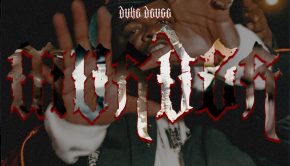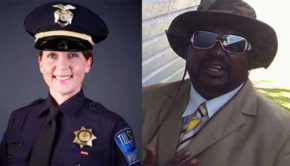Detective Rod Demery On Ahmaud Arbery Case: “What I Saw Was a Murder Take Place!”
“An aggressor cannot claim self-defense.”- Rod Demery
Rod Demery has truly experienced both sides of homicide. Both cases resulted in life altering experiences for him. His mother lost her life. She was murdered when Rod was just 3-years old. Subsequently, 17-years later his brother loss his life after being sentenced to life for committing a murder. In their own way, both instances would shape, Rod’s adult life as he committed his life to bringing justice to families of homicide victims. Best known for reliving his investigations on I.D. Channel’s, “Murder Chose Me,” Demery’s knack to solve complex cases were well documented. He has a perfect rating in that department as there has been a conviction or resolution to all 60-cases where he was assigned as the primary/lead detective role. Recently in Georgia, an incident occurred which led to, Ahmaud Arbery being shot and killed by a father and son duo, Gregory and Travis McMichael. Following the video going viral, the two men were eventually arrested and charged with murder. There aren’t many more qualified to discuss cases like this one and the legal tape that comes with it than, Mr. Demery.
I reached out to, Mr. Demery to get clarification on the laws of executing a citizen’s arrest, injustices within the system and much more!
Let’s get right to it, Mr. Demery, what constitutes a citizen’s arrest?
Rod Demery: In short, basically a citizen’s arrest is that any citizen of the state if they see a crime committed before them, can detain a person until the police get there. You can detain somebody and hold them until the police arrive. In theory and concept, it’s supposed to be, anybody sees something happening, they can act without a certain criminal liability or any other kind of liability. If you see somebody assaulting somebody or committing any crime, then you have the right as a citizen to step in and kind of be exempt from any criminal prosecution.
So, to be clear, this privilege is an “at that moment,” privilege. This doesn’t pertain to someone who you felt committed a crime week’s or days ago or someone who looked like a person that committed a crime.
Rod Demery: I think where the confusion comes in is there is no cut and dry way to do it. Basically, someone has the ability, the option and the legal right to do it. The question is, when people do it do, they apply it correctly or lawfully. And I think that’s where the question is. If you step out there on that limb and you say you’re going to execute a citizen’s arrest, you better be sure you know what you’re doing or that there is actually a crime taking place. That old saying, ignorance of the law is no excuse. You have to be well-versed enough in what you’re doing to know what you’re doing is actually right, or you can be prosecuted for it.
What was your initial reaction when you watched Gregory and Travis McMichael shoot and kill Ahmaud Arbery?
Rod Demery: That it was a murder. My first thought was, it’s a murder. Not withstanding what they may have had in their mind, whether they thought they were right or they thought they were wrong or if they thought that they were enforcing some type of burglary or if it was something more nefarious, they were just racist and they wanted to attack somebody. At either rate, what I saw was a murder take place! Even if they were applying something like a citizen’s arrest. Say you see somebody committing what you think is a crime; whether it’s a burglary or any other crime. And in this case, they claim they saw him on previous occasions… which nullifies it because it has to be something that’s happening at the time. On this particular occasion they said they seen him coming out of a vacant property or lurking around a vacant property. Well, that in itself is not determined to be a crime. Even if it was a crime, it wasn’t his property to trespass across that property. Where they crossed the line is, they tried to use force with firearms. And that can only be applied in a felony situation.
An example of that is, if somebody is breaking into your house and you’re home. Well, that’s obviously a burglary in progress and you can respond in that fashion. If someone has committed a crime and they seem to be leaving the scene of the crime, whether they are running down the street, walking down the street or crawling down the street, now, when you pursue that person, you are no longer effecting a citizen’s arrest. You become an aggressor. So, when I watched it, first thought that came to mind is, an aggressor cannot claim self-defense. At that point you need to be a good witness, call the police and tell them what you saw. But once you start to pursue somebody, set a trap, lay and wait or whatever, you become an aggressor. And if something goes wrong during that pursuit or apprehension or effecting a citizen’s arrest or whatever you want to call it, you’re criminally liable. So, my thought was, at the very least they are guilty of felony murder.
The real issue I had was the DA blocking the initial arrest. Understandingly, the father had worked for this office or whatever, but to have law enforcement on the ground, ready to make an arrest and be denied that arrest was a head scratcher for me.
Rod Demery: Right! And you’re right. Let me try and put it in perspective for you. Whenever there is a complex felony, it’s advisable for whatever detective or police officer to seek counsel from the district attorney’s office. District attorney’s and assistant district attorneys are always on call; 24-hours a day. So, if you’re making a major felony arrest as a police officer, it’s advisable to contact the DA’s office and say, “Hey, this is what I got.” And they’ll look over your paperwork, your warrant or whatever and kind of guide you through it. That’s common practice throughout the country. But a police officer has the position and authority to make an arrest without consulting with the DA’s office and turning that person over to the courts for prosecution, put them in jail and wait for the DA to get the case once they come in. But what you’re seeing is… and I want to be very clear about it, what you’re seeing is not a malfunction of police work, what you’re seeing is a malfunction of a DA’s office. In this case, the police officers wanted to make an arrest. They were told not to by the DA’s office. And even though they could buck the DA and do it anyways, they are smart enough to know that the district attorney is the person who prosecutes the case. So, if they’re told to standby until there is more evidence found or until they put together a grand jury, most police officers are going to comply with that. It’s not often that they are going to buck the other authority. Everybody has to play in the same sandbox.
But as I analyze this case and I see this case, a function or the malfunction happened when the DA’s office sort of took matters into their own hands and provided some sort of preferential treatment towards these suspects in the case. Now, as a police officer… I’m going to speak to you as a police officer. What police officers should do is act under the color of the law with no passion. That means, they follow the evidence wherever it takes them, and they act upon that evidence. That same responsibility is for the district attorney’s office. So, when you see a case like this that’s come to light, I think the blame is kind of misplaced. That’s not saying that racist people should run around with guns and hunt people down or try to catch people because that’s a problem within itself. The major malfunction is the fact that the district attorney’s office has a systemic problem of… you can call it racism; you can call it incompetence or good ole boy system. You can call it whatever you want to call it, but the problem lies in the district attorney’s office.
So, you feel like the blame is being placed in the wrong direction.
Rod Demery: I think we kind of do a disservice… and I’m only speaking as a police officer not as a private citizen. But as a police officer, I think we do such a disservice to people when we look for things that are not prosecutable and that’s the passion in it. It stings, it hurts to know that somebody has that type of hate in their heart, or that type of bias or prejudice in their hear to where they would actually harm somebody based on what they look like. That hurts a lot. But the reality is, in the state of Georgia there is no hate crime legislation. So, as a police officer, you look for what you can prove. And what you can prove is that they killed this man without legal authority and maliciously. And that’s where it should end.
But where we get it wrong is… because we’re so passionate about the struggles that we’ve been through, and because we’re so passionately about the history and the past, that we sometimes forget that the responsibility is that of the government. The district attorney’s office, the people who we voted into office. As long as we have been in this country, there has been racism and hatred towards minorities. And I don’t think it’s going to end anytime soon. And one of the most profound things I heard Dr. Martin Luther King say, was that “You cannot create a law to make a man love me, but you can create one to stop him from lynching me.” So, we make this leap to a place where we can create these laws where people like, Ahmaud won’t be harmed. But someone in the system decides to take that away.
So, our focus and our energy and our efforts should be on that system. And when I look at this case, I can’t help but not say, “I’ve said this before.” Here’s the trick, here is the part that really gets me, that same incompetence, that same preferential treatment translates through all black murders. What I mean by that is, if you go to Chicago, Philadelphia, Baltimore. You go to any largely populated minority inner city and you’ll see black men, black boys being murdered. Now, we don’t have to look for a racist person on the street that committed that murder. Anybody could have committed that murder, but the tragedy in it is that the police failed to investigate those murders and they go largely unsolved, or the person they catch, they can’t prosecute, or they demonize the victim of the murder. This is exactly the same thing. We’re going to have racist, we’re going to have hateful people, we’re going to have people that kill people because of their sexual orientation, because of their color… all sorts of reasons, but as a police officer, I only have the ability to see the crime and what has happened. I get past all the other sub-categories of why it happened.
As an officer, how were you able to remove those emotions and assess and tackle the task at hand?
Rod Demery: In the 90’s there was a big push to incarcerate black men. “They are super predators, they are selling crack cocaine, they’re killing people.” Well, the reality is, you had about 10 million people selling crack cocaine, but they weren’t killing anybody. Same thing with murder against gays. There are a lot of people that don’t like gay people, but they’re not killing them. There are a lot of people that are selling drugs, but they are not killing. There are a lot of people that are racist that we probably see every day, but they are not killing. The reality is, there are people with a propensity to kill. They lack empathy, they are impulsive, they kill out of hatred, out of meanness. Whatever that mechanism is that triggers them to kill is why they kill. My thing as a law enforcement professional is, I can’t investigate the category, I want to remove the evil. Now, what makes that more difficult is that I know there are evil people out there. The problem is the district attorney’s office and the police office departments that aren’t doing their part; like you have in Glynn County. When you have a situation where someone is killed, murdered in the streets. The question is, where do you go to correct that problem. It’s to your district attorney’s office. Because if you’re trying to clean up a hatred or a racial bias in somebody’s mind, you’re going to work until you fall out because they’re everywhere and some of them, you don’t even see. Some of them you would never know. But what you do have control over are the people that represent you in government that are supposed to protect you and provide justice for you and your loved ones. That’s where the fight should be taken.
And I get it. I’ve been black a long time. And I still feel the sting. I get funny looks when I walk in the store. It just depends on what I’m wearing and what I’m doing. I’ve been stopped by police officers for absolutely no reason. And I usually have fun with them. I’ll say, “You know what, I like that little tactic you just did when you got in my blindside and ran my license plate and pulled me over.” And then they realize, “Oh, you’re a police officer.” Yeah, I know the game. All of those things bother me to no end. And the history that my grandparents went through. My grandfather came back from World War I and couldn’t use a white toilet. I get it. But I have to think about that and realize what’s in my control and what’s not in my control. And where we need to look… all our energy and efforts should be going towards the district attorney’s office and police departments. The resounding message that we should get as a community for something like this is, we already realize that we’re not going to get rid of all the hateful racist and evil people in the world, but like Dr. King said, we don’t have to. We just have to make sure we get justice. And if we’re paying these people to give us justice, the district attorney’s office cannot go around telling police officers, because I like this guy because he worked for me, he’s white and I’m white or whatever the case may be, no, we’re not going to prosecute him.
As someone who spent a significant amount of time in law enforcement, what has this been like for you?
Rod Demery: I’ve been struggling with this for the past couple of days, man. Getting past the humiliation and total disrespect that they had for this young man is the tough part. But we have to realize that we have to get past that to get to the real culprit. The reality is, if you have 15% or 20% closer rate on the murder of little black boys, you’re still ineffective. I can only imagine how this young man’s family… the grief, the pain, the misery and what they are going through. But the reality is, there are thousands of black mothers going through the same exact thing. It doesn’t necessarily matter to the person that is grieving. This man killed my son because he came out of the club too late, the person killed my son because he was playing his music too loud, this person killed my son because he was gay or this person killed my son because he was a racist. It still doesn’t take away the pain. We should be able to be effective when we hold those people accountable.
I gotta say, I was pretty proud of the GBI [Georgia Bureau of Investigation]. They stepped up and they said, “You know what, we are going to arrest these people and put them in jail.” That was a phenomenal move by the GBI. I think they are going to see it through. No doubt in my mind about it. If there is anything that came out of this that can be beneficial to us, it’s that, the light has been shined on where the problem is. But we can’t get so distracted with the fact that people don’t like us, disrespect us and want to hurt us, that we forget who really controls things. That’s the difficult part. You’ll see the celebrities come out and denounce it, you’ll see pictures of this young man all over social media as it should be, but that same effort and energy should be focused on the systemic problem that we have with inequality when it comes to law enforcement and prosecution. I hope they get there.
I appreciate your time and educated take on this matter so much. We have to practice logic over emotion and your explanation is a clear demonstration of that mindset. I want to give you the floor. If there is anything that I missed that you want to address, the floor is yours, sir.
Rod Demery: I think Barack Obama said it best, “Don’t boo, vote.” We have that ability to remove people from office like that. That’s where we can be effective, but to think that we are ever conquer the hate that’s in any man’s heart is disillusion. From what I’m understanding this isn’t the first time something like that has happened, so we really need to be careful with that and keep our eye on it. I’m proud to see the way that people have actually come together. It makes me feel good. People realize there is a problem, but I want to make sure that if I’m going to speak on it then I’m righteous in what I say and point them in the right direction from my experience. And what I do know, I’ve fought crime for a lot of years, man… and what I do know is, there are just as many evil people if not more when I was there. But the only progress I’ve ever seen made, is when you have people that are righteous and enforcing the law and prosecuting criminals. This thing seems to be a big web, but it’s not. Our criminal justice system is responsible for falsely incarcerating people. It is responsible for negligently protecting people. When we look at this energy that we got going, we need to focus it on something where we can actually make a real difference rather than fighting a ghost. We will never know who that man is or that woman is that’s a racist.
When you have police officers standing there on the ground ready to take somebody to jail and you call them off when there is a man that’s dead and clearly somebody that has been chased down, pursued and the aggressor is crying self-defense, that’s just outrageous to me. I hope when you put out the word, you get people in that mindset because like you said, logic over emotion every day. If you remove those two from society, how many others do you have out there? It’s overwhelming. That’s exactly why we have the system that we have in place. If that mechanism falls apart, that essential element falls apart, we are in trouble. We can identify who is in charge and we can put all of that energy and effort there. It’s not that people aren’t aware of racists that want to harm you. That’s not the fear. In this day and age, you don’t have many black men that are fearful of those types of people. What you have are people that are fearful that they won’t be protected, and they will be the ones persecuted and prosecuted.
Tweet





























